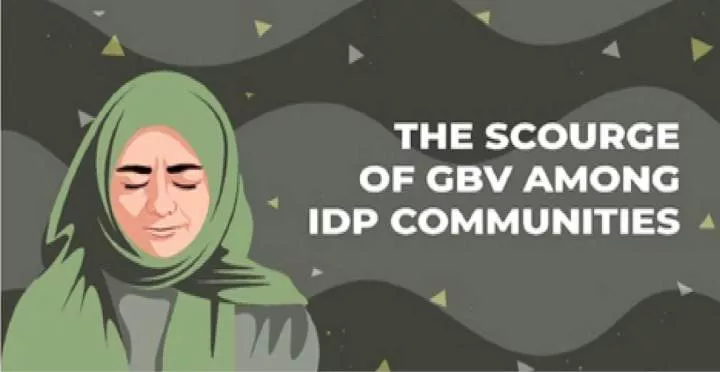
Having escaped insecurity in many parts of northern Nigeria, displaced women now face a new challenge in camps. Here, they are exposed to sexual violence in sorry too form of sex-for-food and other forms of gender-based violence that strip them of their dignity.
Halima Rabiu was barely 18 years old when she had her first child. She now has three children aged between five and one. Together, they live in the Fariya Internally Displaced Persons (IDP) Camp in Jere Local Government Area of Borno State, North East, Nigeria.
She is one of thousands of victims of Boko Haram who fled various communities of the state and are taking refuge in displaced persons' camps littered around Maiduguri, the state capital. But in 2022, the Borno State Government shut down all IDP camps in the state and returned victims to their communities after saying it received communication from the military that the communities were safe.
The Fariya IDP camp, which Halima and about 7,433 people call home, is not part of the government-registered camps, and so, the mother of three and many other displaced persons remain in camps the government does not recognise.
Although the camps offer safety from Boko Haram's onslaught, they expose Halima and other women to various forms of gender-based violence.
She narrated how she conceived and delivered her first child out of wedlock five years ago when a man lured her into an affair, on the promise that he would marry and protect her from the prying eyes of lecherous men in the camp.
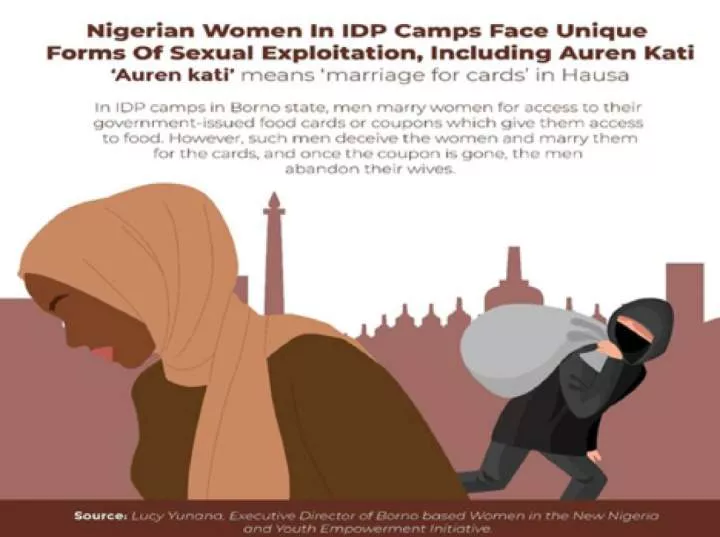
"He used to give me N300, and sometimes, N500 to care for myself and I trusted that he would marry me," she said.
However, as soon as she became pregnant, he disappeared. Halima soon had another suitor and a simple marriage ceremony was quickly arranged.
"I didn't know I was pregnant when I married my husband, but some people suspected and asked if I was pregnant. I denied it. A few months into the marriage, my physical appearance changed and it became obvious that I was pregnant. My husband immediately divorced me and I came back to the camp, where I had my child."
Attempts to trace the man responsible for the pregnancy were unsuccessful as she later learnt from his relatives that he had been killed during an attack by insurgents.
Living in the IDP camp and needing male protection, Halima soon fell for another man who promised to marry her. Barely two years after her first son, she was pregnant again. This time, her relatives acted fast and the man was forced to own up. Following the Islamic injunction, they waited for her to deliver and undergo a waiting period before she could marry.
"We are now married and I had another child, a girl who is less than two years old," she said.
She still lives in the camp with her three children, and recently, her husband. "He joined me in the IDP camp after he lost his job and his first wife divorced him," she said.
Young women like Halima who live in IDP camps are vulnerable to various forms of gender-based violence. Local humanitarian organisations say that women seek protection in marriage, but in many cases, the men who promise to marry them are not always sincere, so they exploit their vulnerabilities for sex.
"In many cases, the women want protection, and so, the men start to come around and sleep with them on the promise that they would marry them. However, when they become pregnant, they abandon them," said Sarah Stanley Balami of the Rehabilitation Empowerment and Better Health Initiative (REBHI), a non-governmental organisation that responds to the needs of vulnerable communities.
"Living in IDP camps puts girls or unmarried women in danger," Balami explained, adding that because many of the displaced persons in Borno State live in tent camps, lecherous men find it convenient to walk in at night and take advantage of them.
"If you are married you have some level of protection, and so, you find many women, in an attempt to get married, fall into the wrong hands," she said.
Factors driving Nigeria's IDP crisis
Nigeria's long war with insurgency in the North East puts Borno State, the epicentre of the war against Boko Haram, on the map of states with the highest number of displaced persons in the country.
According to the Internal Displacement Monitoring Centre, Nigeria had 3.6million people displaced by conflict and violence at the end of 2022, out of which 1.9million were living in protracted displacement in the northeastern state of Borno.
The data shows that Nigeria has the third highest number of displaced persons by conflict and violence in Africa, after the Democratic Republic of Congo and Ethiopia.
However, escalating tensions between farmers and herders in the country's North West and North Central regions have equally created a complex security challenge fuelled by banditry and kidnapping, leading to a huge humanitarian crisis that has seen many more displaced communities in Zamfara, Katsina, Kaduna, Niger, Benue, Plateau and many other northern states.
Benue State in the North Central has also suffered huge displacements as a result of natural disaster and security challenges. Issues around farmer-herder crises over land and resource control, targeted attacks on communities in the hinterlands, as well as communal clashes, have claimed hundreds of lives and left thousands displaced.
The high number of displaced persons have made Benue State another concern for humanitarian organisations, with the United Nations describing the conditions in Benue IDP camps as worse than Borno State.
"What I see in the IDP camps in Benue is worse than what I saw in Borno," said a UN resident/humanitarian coordinator in Nigeria, Dr Mathias Schmale during his visit to the state in July, 2023.
With about 37,412 displaced households and a total population of 2,124,000, the state governor, Hyacinth Alia, in 2023 said only 241,342 persons were living in the state's 13 IDP camps while the remaining 1,882,658 lived within host communities.
But with increased displacements comes increased gender-based violence, said non-governmental organisations working in that area. "GBV among the displaced population of Benue is on the increase," said Dr Helen Teghtegh, the executive director of Community Links and Human Empowerment Initiative in the state.
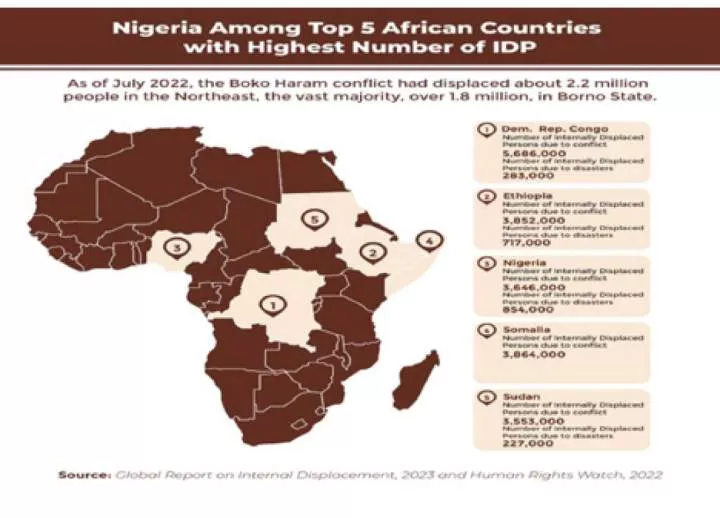
Forms of GBV among displaced population
Women living in IDP camps also face a form of violence tied to marriage. Ajunma Isiyaku expressed frustration over a traditional practice that has left her tied to a man who abandoned her. The mother of four has tried to leave her husband, who she has not seen in two years, but he and his family demand that she returns the bride price before she can walk freely.
"This is someone I have not seen in the last two years. Sometimes he calls if he feels like it. I have asked him to divorce me but he refused and I don't have the money to pay back the bride price," she said, while settling for the evening in the tarpaulin tent that is now her home at a camp in Borno State.
Gender-based violence is rooted in the abuse of power and harmful norms, so Ajunma Isiyaku said she had no choice but to remain married to her husband even though he doesn't shoulder any of her or her children's responsibilities.
Ajunma suffers psychological violence, including threats, purposeful abandonment, neglect and intimidation.
"Her case is complicated because there isn't much we can do," said Sarah Stanley Balami of the REBHI, who said there were other women like Ajunma who face psychological violence.
"We try to get them involved in some of our programmes that will build their capacity and get them some jobs so that they can take care of their children," she said.
Although several forms of GBV cases happen in IDP camps, local humanitarian organisations working in the North East and North Central regions said the most reported cases were rape and other forms of sexual molestation.
The prevalence of sexual violence in IDP camps is captured in the 2019 research report thus: "Sexual and gender-based violence in camps for internally displaced persons and host communities in North East Nigeria." The research by Ojengbede, Babawarun, Olayiwola and others showed about a third (33.2%) of women in IDP camps in North East Nigeria have experienced a form of sexual violence while a fifth (20.5%) reported physical violence.
"There is what we call sex for food. The women offer sex to get food," said Lucy Yunana, the executive director of Borno-based Women in New Nigeria and Youth Empowerment Initiative. Yunana explained that there were also cases of men who exploit women in order to gain access to their food coupons.
"There is also what we call marriage for coupons, which is called'aurenkati' in Hausa. Here, a man marries a woman because he knows the state government has issued her a food coupon. The coupon gives her access to food items periodically. However, such men deceive the women and marry them for the coupon, and once the coupon is gone, they abandon them," she said.
"This was common before the Borno State Government closed the registered camps. It is a GBV issue because the government gave some women coupons because they are vulnerable and have children, but the men will now marry them for that coupon and then later abandon them," Yunana explained.
These kinds of exploitation have also manifested in displaced persons' camps around Benue State, where local humanitarian groups said such gender-based violence sometimes came from the top.
"This plays out in the IDP camps where community members would want sex in exchange for food, and sometimes it comes from the IDP committee in charge of mobilising or registering displaced persons. They could say that before you are documented or for you to be given a coupon you must exchange it with sex," explained Dr Helen Teghtegh, the executive director, Community Links and Human Empowerment Initiative in Benue State.
"At the committee level in the camp, we are yet to arrest or get any staff or pin someone at the coordination level. But amidst themselves, committee members or coordinating IDP committees, they harass the female gender and demand for sex, either to be documented or to be given food," she said.
Dr Teghtegh, who is also the Benue State coordinator for Civil Society Organisations, said displaced women living in communities also got raped when they go out in search of firewood.
"Even when they request some portions of land for gardening, they are asked to exchange that for sex, and when they refuse these sexual advances, they are sometimes denied rights to portions of land for gardening," she said.
However, aid workers say the most common form of GBV among married couples in camps is physical violence, mostly because husbands attempt to confiscate aid materials given to their wives and children.
"Most displaced communities living in the camps are almost entirely dependent on humanitarian aid, and many humanitarian organisations focus on women and children when distributing aid," said Sarah Stanley Balami of REBHI.
"For some of the men, if you give them the assistance they may end up getting married and forgetting about their wives and children," she said, explaining the rationale of distributing food aid to women.
"But this becomes a marital challenge when the husband tries to take whatever was given to the wife; any resistance on her part may lead to physical abuse," she said.
Breaking the silence on GBV
Gender-based violence (GBV) against women and girls is a global pandemic that affects one in three women in their lifetime, according to the United Nations.
While there is no publicly available data on the prevalence of GBV in IDP camps or IDP communities in Nigeria, violence against women and girls occurs daily and most of them are not reported. However, the National Gender-Based Violence dashboard of the Federal Ministry of Women Affairs shows that the country has 27,338 GBV cases, out of which 1, 130 are fatal and 1,706 have been closed.
States with the highest number of GBV cases include Sokoto, Niger, Federal Capital Territory (FCT), Lagos, Cross River, Adamawa, Ebonyi, Edo and Oyo. The Nigeria Demographic and Health Survey estimates that 40 per cent of Nigerian girls and women aged 15 to 49 years have experienced physical or sexual violence in their lifetime, but issues of rape are underreported, said Lucy Yunana, who explained that humanitarian organisations had made some sensitisation efforts, but more is needed.
"Rape is underreported in Borno State. And to be frank, the culture of silence is there because the women believe that a raped woman or girl will not get a husband," she said.
Even when women go all out to report such cases, Dr Helen Teghtegh said they did that only for medical attention and not justice.
"In IDP camps recently, because of sensitisation, there has been an improved number of people reporting rape and sexual molestation. But because of the stigma that comes with these issues, they report not to get justice, they report to access medical attention when needed and to also access mental and psycho-social support," Teghtegh said.
She said the progress in women speaking up was linked to a lot of sensitisations that had been carried out.
"A few selected non-governmental organisations that are into mental and psycho-social support step into the camp to do a lot of sensitisation, then create safe spaces for those who need counselling services. Where the cases need referrals, whether legal, medical or psychiatric, they are referred," she said.
The humanitarian worker, however, admitted that more needed to be done by state and federal government agencies to ensure that displaced persons who once lived in dignity in their own homes and worked on their farms are no longer boxed into a corner.
"So, the government needs to bring up social inclusion packages for the vulnerable, women learning skills and start-up businesses that are not hijacked by politicians, but targeted to these women in IDP camps," she said.
Dr Helen Teghtegh said such efforts would ensure that displaced persons are reintegrated into communities where they would be accepted. "It will go a long way to help in mitigating increased GBV cases among the displaced population," she said.
This article was produced with the support of the Africa Women's Journalism Project (AWJP), in partnership with the International Centre for Journalists (ICFJ), as well as support from the Ford Foundation.

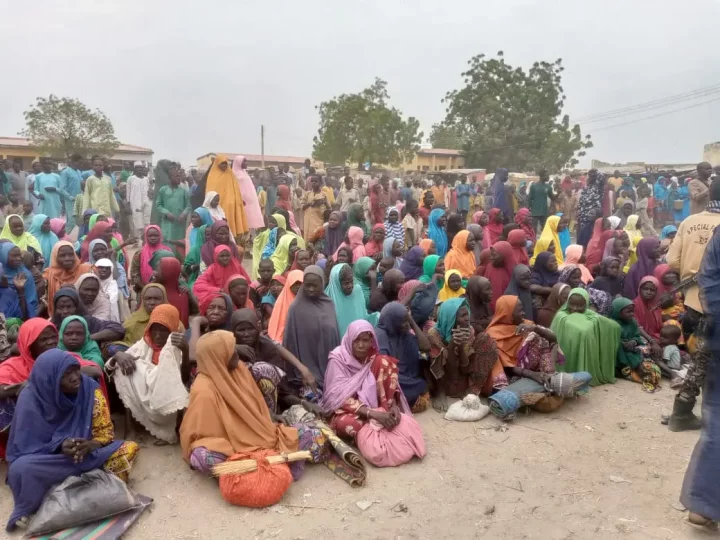


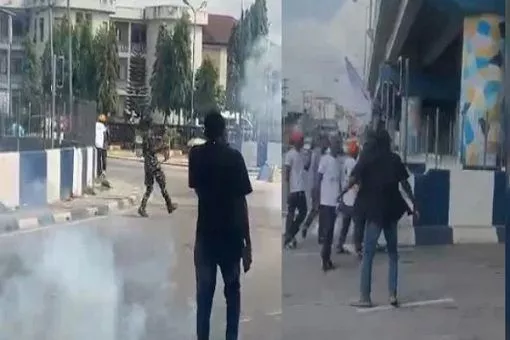
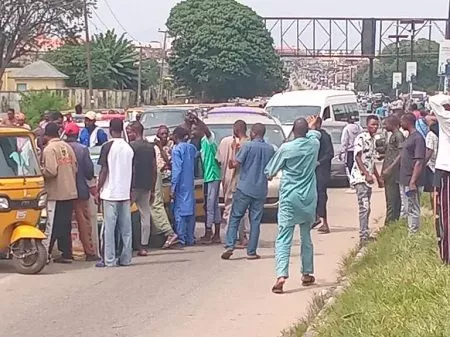
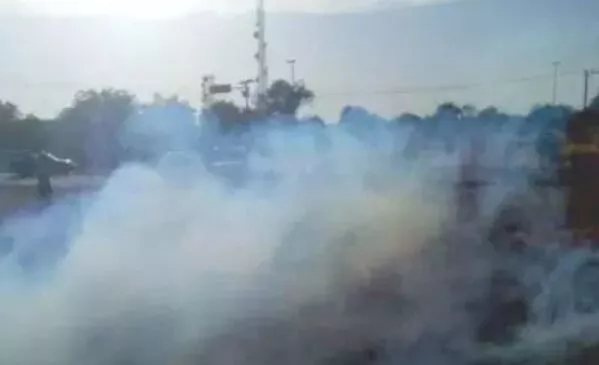

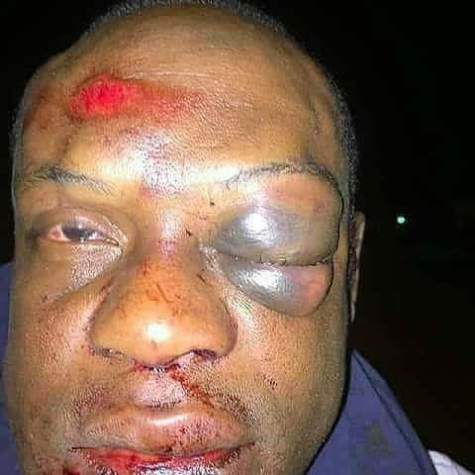

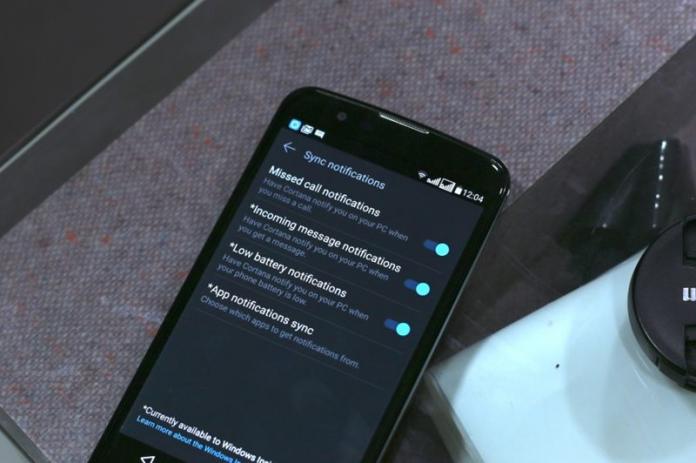


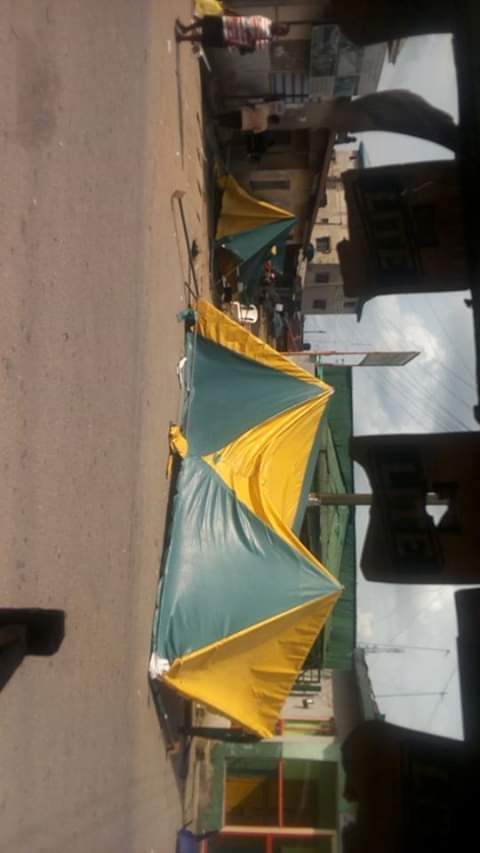

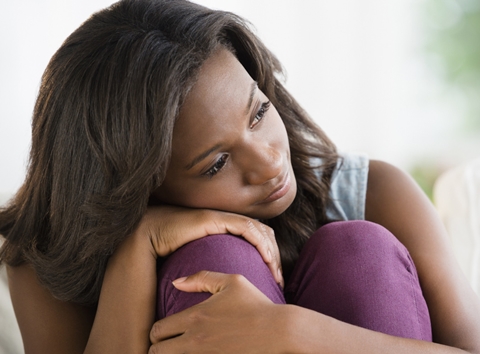

Comments